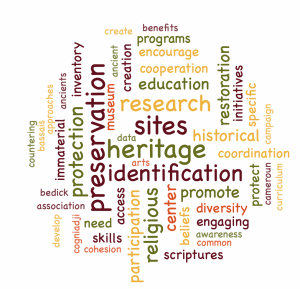2.1 % of participants reporting having a better ability to design approaches on preserving religious and cultural heritage in their country based on examples discussed at the conference
To measure the degree to which participants can endorse concrete actions toward preserving the cultural and religious heritage in the concerned regions, we look at the levels of confidence which participants reported in their perception to have gained additional knowledge (indicator 1.2 ) and their ability to identify future approaches.
Participants indicated that more efforts to integrate communities can be initiated. It is important to note that several studies explain that community engaging communities include not only their participation but also empowering them to the different aspects of heritage protection, including research and management. One respondent explains that “I have learned today that cultural heritage can be a profitable and income-generating industry; this is a great way to involve communities.”
| Words and association | Frequency pourcentage |
| We need to develop a better coordination among actors | 23% |
| Religious education needs to be more tolerant | 12% |
| Integration among culture is a key aspect to sustainability of initiative | 11% |
| Simplify the procedures and process for protection, | 21% |
When asked if they are currently working on any cultural protection initiatives 46% of the respondents answered positively. “The challenges are several” explains one respondents from the NGO sector explains, “ either we are confronted to very heavy bureaucracy or blatant opposition, to succeed we need to make sure that we have supporters on our side who can champion our initiatives”. These projects included protection of historical and religious sites and memorials, the management of museums, research projects, publications, preservation of historical objects.

One respondent explained that “One of the challenges is to bring all the influential players at the table, researchers, peace-builders and ministries, and to identify the priorities together.” In the context of protection of the cultural heritage of religious minorities in the Middle-East, Sahel and Sub-Saharan African countries, the collaboration with inter-governmental organizations is critical. However lack of legal enforcement and skills often impede these efforts.
The panels inspired a discussion among participants on the role of different actors and how they can develop an integrative strategy to protect cultural heritage. Overall, participants were satisfied with the topic discussed; one participant added: “The conference is very useful for us; I learned more about conservation and alternative strategies such as arts.”
Ind 2.2 % of participants aware of the importance to protect cultural heritage in their community.
Among the participants who responded to the survey, the majority believe it is an important issue. The majority explained the importance of how protecting their cultural heritage has impacted positively their community for three main reasons. Indeed the illustration below shows that 26% of the respondents consider that protecting cultural heritage contributed to the prevention of conflicts. One respondent indicated that “ Cultural heritage protection helps recognizing the diversity of community and contributes to foster peace and tolerance”. 23 % of the respondents consider that cultural heritage protection has a positive impact on conflict resolution efforts. It helps unite groups around a shared memory and reduce identity-based discriminations. Cultural heritage protection also contributes to reinforce the protection of minorities’ rights ( 21%) socio-economic growth (15%) and social cohesion (15%). One respondent defines cultural heritage as a tool to integrate marginalized communities,
The conference panel highlighted that cultural heritage is not only a universal issue but it is also integrated within societal needs and expectations for future development. It has been recognised as being the engine for socio-economic development. “Education and religious literacy are at the center of this issue, but also making sure that communities’ needs are answered”. Not only does it relates to the tourism industry but also to research and education, human rights protection and political progress.
